Can the media hold powerful corporate actors to account in an age of rising concentration? A Stigler Center panel offers opposing views.

The election of Donald Trump has brought about an incredible resurgence of investigative journalism. Following a long period of allocating fewer and fewer resources to the costly and time-consuming work of investigating misdeeds by politicians, regulators, and corporate executives, news outlets are now hiring reporters and creating new desks devoted to investigating the president’s numerous potential conflicts of interest. A surge of public interest has resulted in rising advertising revenues, also known as the “Trump Bump.” Trump’s open hostility toward the media has also led to an outpouring of support in the form of subscriptions and contributions.
In a January Politico piece titled “Trump Is Making Journalism Great Again,” Jack Shafer wrote that Trump and his (then forthcoming) presidency “may be the greatest gift to Washington journalism since the invention of the expense account,” allowing political reporters to venture beyond transactional relationships with Washington insiders for information. “In his own way, Trump has set us free,” wrote Shafer.
Yet the question remains whether the media can be as free when it comes to powerful business groups. In an interview with ProMarket last year, investigative journalist and media critic Dean Starkman offered a thorough critique of business journalism in the run-up to the 2008 financial crisis. Journalists, he argued, particularly business journalists, had become all too reliant on access reporting, which “tells readers what powerful actors say” rather than telling readers what they do, making journalists part of the establishment they were supposed to scrutinize and leaving them ill-equipped to investigate systemic frauds. Asked whether the media is now better positioned to recognize systemic risks, Starkman offered the following response:
“No, no, absolutely not. . . .Are we better set up to cast the net more widely? To find dissenting voices and listen to them? Are we more open to seek out convincing whistleblowers and protect them? Do we have resources to knock on doors and climb stairs of tenement apartments? The answer is ‘no.’ It’s the opposite.”
Starkman cited two then-recent media misses: The water crisis in Flint, Michigan, and the middle class and blue-collar rage that contributed to the ascendance of Donald Trump, then the leading candidate in the GOP primary. If the media continues to abdicate its accountability role, he warned, “we will always be living in a state of perpetual surprise.” Eight months later Trump won the presidency, shocking the media and political elites.
The press plays a crucial role in the proper function of democracy and competitive markets. In a 2002 paper on the “Corporate Governance Role of Media,” Alexander Dyck and Luigi Zingales [Director of the Stigler Center and also one of the editors of this blog] argued that the media has the power to shape corporate policies and pressure managers into behaving within societal norms. In a 2008 paper, Dyck, Zingales, and David Moss argued that media can serve as a “counterbalance to special interests,” thereby reducing the likelihood of regulatory capture.
Yet in an age when the business and media landscapes are increasingly concentrated, and with digital platforms like Google and Facebook siphoning advertising revenues and taking control of the infrastructure, the press—particularly the financial press—remains beleaguered.
During a panel at the recent Stigler Center conference on concentration in America, Pulitzer Prize-winning journalist Jesse Eisinger offered an anecdote that spoke to the current state of business journalism.
“Normally on this weekend, I judge the premier business journalism award, the Loebs,” said Eisinger. “This time I couldn’t, so a colleague of mine, an editor, took my place. She was doing the features that all the business and regular news organizations had submitted. She came to me and she really was kind of confused. She said, ‘This is supposed to be the best business news, the best business features of the year. And it seems like mainly what they are is [a] journalist gets access to a corporate executive and writes about what he or she is doing at the office or at home—they think that that’s a good feature.’”
The story, suggested Eisinger, a senior reporter for ProPublica, was emblematic of the challenges facing business journalism: “Business journalism fails spectacularly in holding the powerful to account.”
In addition to Eisinger, the panel featured David Dayen, author of Chain of Title: How Three Ordinary Americans Uncovered Wall Street’s Great Foreclosure Fraud (The New Press, 2016) and a contributor to The Intercept and The Nation; Patrick Foulis, the New York bureau chief and U.S. business editor for The Economist; Jonathan Sallet, former deputy assistant attorney general for litigation at the Department of Justice’s Antitrust Division (2016-2017) and currently a visiting fellow in governance studies at the Brookings Institution; and Matt Stoller, a fellow at the Open Markets program at New America. The panel was moderated by Guy Rolnik, a Clinical Associate Professor at Chicago Booth and Co-Director of the Stigler Center [also one of the editors of this blog].
Much of the panel focused on the role that the business media plays in either pushing for competition or helping incumbents and special interests cement the status quo, and it veered between optimism and pessimism. Eisinger, for his part, began with a grim diagnosis: “We’re in deep trouble, and mainly I think it’s because the business model’s collapsing.”
The rise of the investor-oriented press
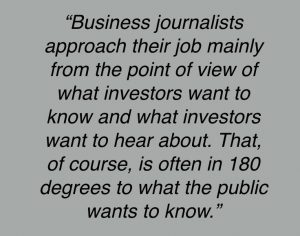
At the root of the problem, said Eisinger, is a structural shift that saw the decline of major metropolitan newspapers that used to do some business reporting.
“What arose in their stead are places like Bloomberg and Reuters which, of course, do cover business. The main consumers of those products are investors,” he said. “And so business journalists approach their job mainly from the point of view of what investors want to know and hear about. That, of course, is often in 180 degrees to what the public wants to know.”
“The structure of business news,” argued Eisinger, “is that the businesses control the news to a much greater degree than in any other area of the media. In politics, you have a built-in adversarial system. Of course, that excludes fringe views, and this is a deeply flawed process, but at least [journalists] understand that there are at least two views in a story. Business journalists rarely understand that, and so the structure of business news is that most of [it] is controlled by business. Businesses choose to report when they’re going to develop a product. They choose to report when their earnings are coming out. They usually report changes in their executive structures. All of this initiates from their point of view, and the journalists are often reactive.”
Moreover, the rise of investor-oriented outlets has led to “a substitution of general interest publications that were interested in trying to answer questions about businesses, and whether they were good for the public, with whether business produces something that’s good for investors or bad for investors,” said Eisinger.
At the same time, other outlets moved away from investigative business reporting. “The Wall Street Journal [was] at one point the premier business news organization in the country. Rupert Murdoch took it over, and Murdoch is ideologically not interested in investigative news of corporations, but he also wanted to take on The New York Times as a competitor. You saw a huge swath of business news reporters from the Wall Street Journal refocused to covering other areas, mainly politics. You’ve seen this extraordinary decline in business news reporting, and the importance of investor-oriented news rise in its place, which has led us to a deeply problematic place.”
While coverage of the financial sector has improved since the crisis, Eisinger noted, and tech media does have some investigative reporting amid “mostly adulatory coverage,” vast sections of the economy have been “terribly neglected”: “Retail, industrial, ‘flyover country’—as we derisively say on the coasts—those are ripe for accountability journalism. We hardly do any of it.”
A “relatively OK picture”
Foulis, who writes The Economist’s weekly “Schumpeter” column and was the author of a March 2016 cover story that examined rising corporate concentration and profits, countered with a more optimistic take on the current state of business journalism.
Foulis outlined three tests for determining the health of the media: 1. Is there a hard core of publications that have a “serious agenda,” are reasonably well-resourced to find out facts, and have ethical procedures in place for dealing with conflicts of interest? 2. Is there a diversity of views? 3. Does the public, in general, care about the media and what it publishes?
Overall, Foulis said, “I think there is still a core of responsible publications which are well-resourced. There is a diversity of outlets. Whether the population pays attention and wants to care about news, I think you can debate [that] a bit.” Foulis pointed out three reasons for concern that the “relatively OK picture is going to deteriorate.” One was journalism’s still-crumbling business model.
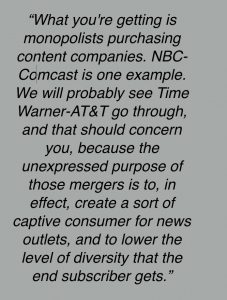 Another was vertical mergers: “What you’re getting is monopolists purchasing content companies. NBC-Comcast is one example. We will probably see Time Warner-AT&T go through, and that should concern you, because the unexpressed purpose of those mergers is to, in effect, create a sort of captive consumer for news outlets, and to lower the level of diversity that the end subscriber gets.”
Another was vertical mergers: “What you’re getting is monopolists purchasing content companies. NBC-Comcast is one example. We will probably see Time Warner-AT&T go through, and that should concern you, because the unexpressed purpose of those mergers is to, in effect, create a sort of captive consumer for news outlets, and to lower the level of diversity that the end subscriber gets.”
A third cause for concern is social media platforms. A lot of attention has been given in recent months to the rise of fake news, leading to pressures on digital platforms like Facebook to curtail the phenomenon. Foulis believed that platforms will eventually be forced to act. “The platforms know exactly who these people are. They could, in a week, identify and knock out all of the Macedonian teenagers, and they could find out who all of the Russian propaganda bots are. They know how to do it, and I think the pressure and the backlash over fake news and network propaganda is going to force the platform companies to start intervening very heavily in what is published,” he said.
This, Foulis cautioned, will be a “move from one evil, which is platform companies pretending that they’re sort of neutral and uninvolved in the news cycle while publishing lots of nonsense, to another where those same monopolistic platform companies actually have a much more heavy involvement in what is published. You can pick your evil and decide which of the two is the lesser.”
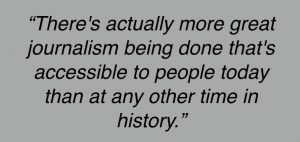 Dayen, whose book won the the Studs and Ida Terkel Prize, offered a more optimistic view as well. “The truth is that we have this sort of paradox of abundance. There’s actually more great journalism being done that’s accessible to people today than at any other time in history,” he said. Dayen cited the Los Angeles Times investigation that uncovered the Wells Fargo scandal as an example of the great reporting that is still taking place.
Dayen, whose book won the the Studs and Ida Terkel Prize, offered a more optimistic view as well. “The truth is that we have this sort of paradox of abundance. There’s actually more great journalism being done that’s accessible to people today than at any other time in history,” he said. Dayen cited the Los Angeles Times investigation that uncovered the Wells Fargo scandal as an example of the great reporting that is still taking place.
Dayen also raised two causes for concern. One was so-called “news deserts.” Another was paywalls: “Whereas the theory is that information wants to be free, information is not free. It’s not a marketplace of ideas, it’s a walled garden of ideas, and if you have the funds, if you have the money to be able to pay for that insight and ability to extract journalism, you’re going to be a much more informed citizen about what’s happening in your politics [and] what’s going to affect you and your neighbors and your friends.”
This situation, Dayen warned, is potentially dangerous. “If you cannot access this very rich material unless you have a certain pedigree and a certain disposable income, what does that mean for society at large, and what does that mean for the freedom of information?”
Antitrust and open internet rules
Sallet, the only non-journalist in the panel and also the former general counsel at the Federal Communications Commission, raised concerns over the likely undoing of the FCC’s Open Internet rules and the potential impact this could have on the marketplace of ideas.
“Should a broadband provider be able to block lawful content that a consumer wants to get to? That’s very important, because media outlets from the left or the right that promote unpopular views may be unpopular with the companies that provide broadband service. In America today, the large companies tend to be companies that both provide broadband service and distribute news and other kinds of programming themselves. It may be a question of whether a consumer can get to a news outlet that’s directly competitive with a news outlet that is owned by, or distributed by, the broadband provider.”
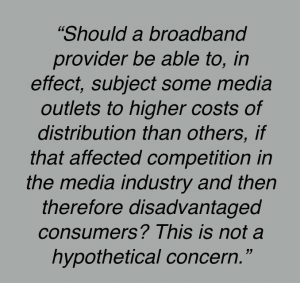 Sallet continued: “Should a broadband provider be able to, in effect, subject some media outlets to higher costs of distribution than others, if that affected competition in the media industry and therefore disadvantaged consumers? This is not a hypothetical concern.”
Sallet continued: “Should a broadband provider be able to, in effect, subject some media outlets to higher costs of distribution than others, if that affected competition in the media industry and therefore disadvantaged consumers? This is not a hypothetical concern.”
The concern, he said, is “the possibility that ownership of content could be used to deprive competitors of the distribution company of valuable programming, or alternatively, that the distribution company could close itself off to rival content, each in a way that could harm diversity and economic outcomes”.
In order to avoid this scenario, he said, regulators should adhere to non-discrimination rules: “Non-discrimination requirements would, in effect, ensure that all media outlets, whether they are soft-spoken or shrill, whether they are left or right, whether they are polite or rude, would be able to find their way to a consumer over the conduit that is the broadband connection.”
Journalism’s crisis of legitimacy
Stoller, who prior to joining New America spent six years on Capitol Hill, most recently as a senior policy advisor to the Senate Budget Committee, addressed what he called “the crisis of legitimacy in journalism.”
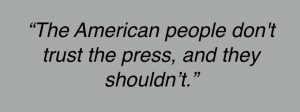 “The American people don’t trust the press, and they shouldn’t,” said Stoller, who cited flawed reporting during the lead-up to the Iraq War and the media’s neglect of the foreclosure crisis as two examples of “bad journalism.” The foreclosure crisis, he said, was ignored for a number of reasons: “It was ignored because people didn’t want to know about it. It was also ignored because we were in a crisis and journalists didn’t want to write about it, didn’t know how to write about it.”
“The American people don’t trust the press, and they shouldn’t,” said Stoller, who cited flawed reporting during the lead-up to the Iraq War and the media’s neglect of the foreclosure crisis as two examples of “bad journalism.” The foreclosure crisis, he said, was ignored for a number of reasons: “It was ignored because people didn’t want to know about it. It was also ignored because we were in a crisis and journalists didn’t want to write about it, didn’t know how to write about it.”
This crisis of legitimacy, Stoller said, is also being “sort of fixed by the people themselves,” as people increasingly share videos and information online.
Another major force affecting journalism today is the growing power of digital platforms. “Advertising monopsony and power [are] affecting the innovation that would be coming out of lots of these places that are actually doing new journalism. The fundamental problem is that the revenue stream has been concentrated in the advertising market. The relationship has been changed from publisher and reader to essentially a financial market, where you have these weird intermediaries, be it the ad tech firms or the monopolists.”
From a policy perspective, he said, “we need policy and regulators who are going to protect the relationship between people that produce and create content, and the readers of that content, and the advertisers who want to reach those readers. Right now, we’re not doing that.”
Ultimately, however, challenging the advertising power of digital monopolies would require “changing people’s minds about what’s important,” said Stoller. “You have to break down that wall between business and politics. You have to reestablish a culture of integrity in government, in big law, in business, across society, because it’s not just about journalism.”






